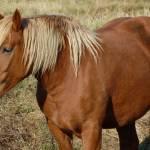Fighting Equine Obesity: Some Practical Suggestions

Obesity is a widespread problem in the horse population. Owners may not realize that overweight horses have more strain on their legs and feet than thinner equines; fat horses are often less successful in breeding programs; excess weight makes it harder to keep horses from overheating in warm climates or while exercising; and obesity is linked to exercise intolerance and less efficient performance, regardless of the owner’s chosen equestrian discipline.
Kathleen Crandell, senior equine nutritionist at Kentucky Equine Research, offers the following tips for keeping horses at a healthy weight.
- Realizing that a horse is too fat is the first step. If the ribs can’t be felt with gentle finger pressure, chances are good that the horse is carrying extra weight.
- Not every horse needs grain. The first step for overweight horses is to cut grain out of the diet, substituting a low-calorie supplement that contains necessary vitamins and minerals.
- Use a grazing muzzle to limit pasture intake while allowing the horse to continue to be turned out. Exercise and social interaction are important, and pasture time provides both.
- Use a hay net with restricted access (smaller openings than in a normal net) so that the horse spreads hay consumption over a longer period of time.
- Hay is an excellent food for horses, but many owners don’t really think about the fact that hay contains calories. Have hay tested to find a low-carbohydrate type, or soak hay for 30 to 60 minutes before feeding it. This reduces carbohydrate level but fulfills the horse’s need for fiber.
- If the horse’s exercise program is reduced in time or intensity, the diet should be adjusted to provide fewer calories.
- Owners should determine their horse’s weight with a scale or weight tape and should take this measurement every two to four weeks. The absolute weight is not as important as tracking gain or loss and adjusting the feeding program accordingly. “He looks a little thinner” is not an adequate estimation of whether feeding changes are making a difference; get the figures and see what trends are developing.
- Be serious about weight loss efforts for your horse. Resist the urge to take off his grazing muzzle for a few days; don’t feel so good about cutting out grain that you are tempted to feed lots of carrots or other treats; stick with your resolve to increase the horse’s exercise level gradually to burn more calories.








